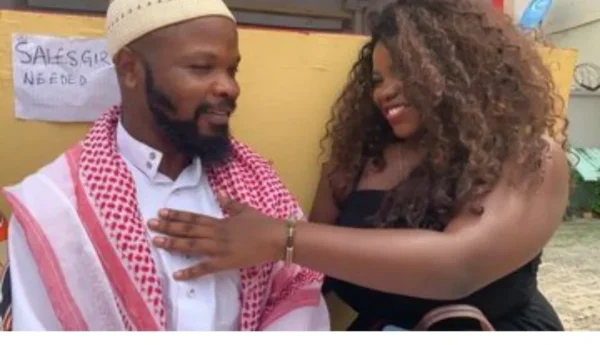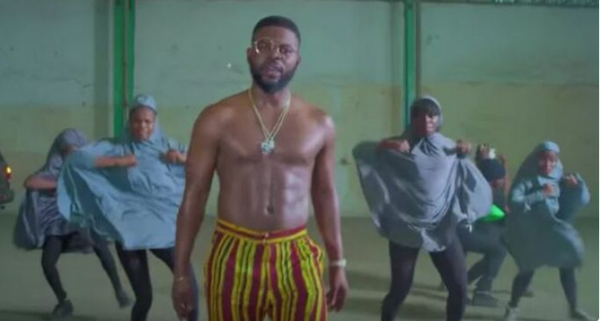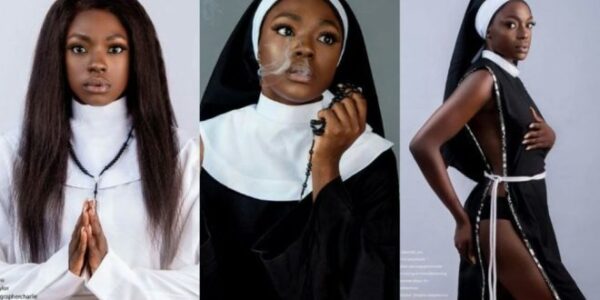Davido’s Instagram Post: Five Times Entertainers’ Contents Have Caused Religious Controversies
Nigeria’s social media space has been on fire over a 45-second trailer clip of a musical video the Nigerian pop-star, Davido, had posted on his Instagram handle to advertise a new musical release for an artiste, Logos Olori, working under his label to his millions of followers on Instagram.
The controversial clip featured some men in white Jallabiya dancing in front of a mosque, a few seconds after they were seen performing the Muslim daily prayer, salat.
The video caused anger and offense among many Nigerian Muslims online who demanded that Davido should pull down the video and apologize for offending their sensibilities by mixing sacred Islamic rituals with song and dance.
They called for its retraction, including the popular Kano-born Nigerian actor, Ali Nuhu.
Davido later bowed to the pressure and deleted the controversial music video.
However, Davido’s case was not the first entertainment content that led to a religious controversy in the country.
There have been a number of entertainers who raised dusts on religious grounds over their contents, as highlighted by the Daily Trust.
Nedu Wazobia

Nigerian comedian and On-Air Personality, Chinedu Ani Emmanuel, otherwise known as Nedu was in January 2021 accused of “tarnishing and disrespecting the sanctity of Islam” in his clownish skits where he played the alter ego-personality, Alhaji Musa.
Many Muslim organizations and individuals across the country considered it offensive seeing the comedian adorning his trademark Islamic attire (white Jallabiya with Arabian muffler and cap) while mimicking Hausa accent as he flirted with busty and scantily dressed ladies in many of his videos on social media.
A Muslim group, Ta’awunu Human Rights Institute (TOURIST), in a statement said the comedian’s character as Alhaji Musa was “a disturbance to public peace” adding that it was capable of inciting “religious violence in the country if nothing is done about it.”
The group demanded that the comedian be arrested and interrogated for “parading himself as Alhaji Musa in an attempt to disrupt public peace and incite religious violence or produce himself within 30 working days for a fair chance of being heard, failure of which we shall be obliged to institute legal action against him.”
Falz

In June 2018, Nigerian musician and actor, Folarin Falana popularly known as Falz, trended over a music video titled “This Is Nigeria” that some Muslims deemed offensive and inappropriate.
In the video, some girls dressed in hijab were seen dancing to the then trending “shaku shaku” dance.
A prominent Muslim group, Muslim Rights Concern (MURIC) asked Falz to withdraw the video and apologize to Nigerians, or face legal action.
Responding to criticisms that trailed the video, Falz explained that the girls were a representation of the abducted Chibok girls still in Boko Haram captivity.
But MURIC, in another statement said the dancers in the video in no way depicted the situation of the Chibok girls.
The group also condemned “a character that dressed like a Fulani man, who suddenly abandoned his traditional guitar and beheaded a man” featured in the video.
Describing the video as “thoughtless, insensitive and highly provocative,” MURIC said it could brew religious and ethnic crisis.
Beverly Osu

Towards the end of 2018, Nigerian actress and model, Beverly Osu, who became known after she participated in popular reality show Big Brother Africa in 2013, offended a number of people after she took photos wearing what looked like a nun outfit while smoking a cigarette.
The photos were frowned upon by many people especially Catholics who felt she disrespected their faith, but the entertainer felt otherwise.
In a chat with Saturday Beats, Osu revealed that she was the creative director of the photo shoot but did not expect the backlash Nigerians meted out to her.
She said, “I received a lot of death threats in my direct message on social media. I also received phone calls, saying I shouldn’t come out. People called my mother to threaten her life but I felt that they were all bluffing. Sincerely, I didn’t expect it, and there was nothing to cope with because I wasn’t bothered. I was not scared because I’m not afraid of anybody.”
Yahaya Sharif-Aminu

In August 2020, a musician in Kano State, Yahaya Sharif-Aminu, was sentenced to death by hanging for blaspheming against the Prophet Muhammad.
An upper Sharia court in the state said the 22-year-old Sharif-Aminu was guilty of committing blasphemy for a song he had circulated via WhatsApp.
Sharif-Aminu did not deny the charges.
The singer quickly went into hiding but he was later captured and detained.
Protesters had burnt down his family home and gathered outside the headquarters of the Islamic police, known as the Hisbah, demanding action against him.
Critics said the song was blasphemous as it praised an imam from the Tijaniya Muslim brotherhood to the extent it elevated him above the Prophet Muhammad.
Sharif-Aminu later appealed the judgement.
(Daily Trust)


